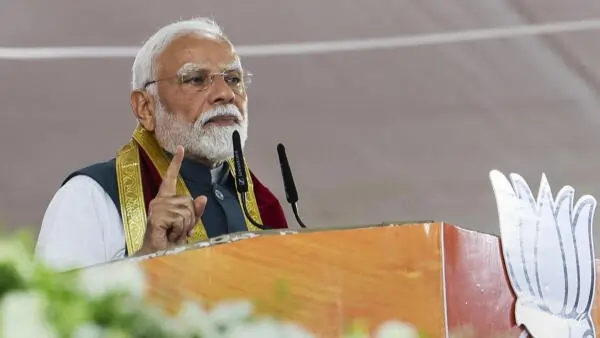On May 29, 2025, Prime Minister Narendra Modi launched a scathing attack on the Trinamool Congress (TMC) government in West Bengal, accusing it of mishandling the recent violence in Murshidabad.
Speaking at a public meeting in Alipurduar, Modi highlighted the state’s alleged administrative failures and corruption, particularly in the context of the Murshidabad unrest.
The Murshidabad Violence
In April 2025, Murshidabad district witnessed significant unrest following protests against the Waqf (Amendment) Act, 2025. The demonstrations escalated into violent clashes, resulting in the deaths of three individuals and injuries to over ten others.
The violence included arson, looting, and attacks on public infrastructure, leading to the displacement of more than 400 people. The Calcutta High Court intervened, ordering the deployment of central forces to restore order.
PM Modi’s Allegations Against TMC
During his address, Prime Minister Modi accused the TMC government of exhibiting cruelty and negligence during the Murshidabad violence.
He alleged that TMC leaders were complicit in the unrest, stating that party members, including legislators and councilors, were involved in identifying and targeting homes for arson. Modi criticized the state police for inaction, suggesting that law enforcement watched passively as violence unfolded.
Modi further claimed that the TMC government prioritized appeasement politics over the safety and welfare of its citizens. He highlighted issues such as corruption, unemployment, and crimes against women as systemic problems under TMC’s rule.
TMC’s Response
In response to Modi’s accusations, TMC leaders defended their administration’s actions and criticized the Prime Minister for politicizing the issue. They argued that Modi’s remarks were more characteristic of a party leader than a national statesman.
TMC officials emphasized their commitment to maintaining law and order and accused the central government of using the situation for political gain.
High Court’s Findings
A fact-finding committee appointed by the Calcutta High Court investigated the Murshidabad violence and reported significant administrative failures.
The committee’s findings implicated a TMC leader in instigating the unrest and criticized the lack of police response during the incidents. The report called for accountability and urged the state government to take corrective measures.
Political Implications
The Murshidabad violence and subsequent political exchanges have intensified the rivalry between the BJP and TMC in West Bengal.
Modi’s allegations aim to position the BJP as a party committed to law and order, contrasting with TMC’s alleged administrative lapses.
As West Bengal approaches future elections, such incidents are likely to influence voter perceptions and campaign strategies.
The Murshidabad violence has become a focal point in the political discourse between the BJP and TMC. Prime Minister Modi’s criticisms highlight concerns over governance and public safety in West Bengal, while TMC’s responses underscore the ongoing political tensions in the state.
The situation emphasizes the need for effective administration and accountability to prevent such incidents in the future.

